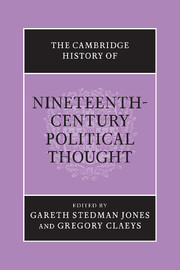Book contents
- Frontmatter
- Contents
- Contributors
- Acknowledgements
- Introduction
- I Political thought after the French Revolution
- II Modern liberty and its defenders
- III Modern liberty and its critics
- IV Secularity, reform and modernity
- 18 Church and state: the problem of authority
- 19 The politics of nature
- 20 Conservative political thought from the revolutions of 1848 until the fin de siècle
- 21 Modern liberty redefined
- 22 Political economy
- 23 German socialism and social democracy 1860 –1900
- 24 Russian political thought of the nineteenth century
- 25 European political thought and the wider world during the nineteenth century
- 26 Empire and imperialism
- Epilogue
- Biographies
- Bibliography
- Index
Epilogue
French Revolution to fin de siècle: political thought in retrospect and prospect, 1800–1914
from IV - Secularity, reform and modernity
Published online by Cambridge University Press: 28 July 2011
- Frontmatter
- Contents
- Contributors
- Acknowledgements
- Introduction
- I Political thought after the French Revolution
- II Modern liberty and its defenders
- III Modern liberty and its critics
- IV Secularity, reform and modernity
- 18 Church and state: the problem of authority
- 19 The politics of nature
- 20 Conservative political thought from the revolutions of 1848 until the fin de siècle
- 21 Modern liberty redefined
- 22 Political economy
- 23 German socialism and social democracy 1860 –1900
- 24 Russian political thought of the nineteenth century
- 25 European political thought and the wider world during the nineteenth century
- 26 Empire and imperialism
- Epilogue
- Biographies
- Bibliography
- Index
Summary
An overview from 1900
Commentators writing in various countries between 1900 and the eve of the First World War disagreed profoundly about what had been the core themes and trends in the evolution of political thought over the course of the past century. In Edwardian Britain there were those who interpreted the predominant political ethos of the previous hundred years as marked by ever-increasing voluntarism, privacy, personal liberty and the progressive limiting and ‘discrediting’ of the powers of the state. And there were others who saw the history of the period in exactly the opposite terms, as signifying the eclipse of ‘individualism’, the decline of ancient self-governing communities and corporations, and the inexorable rise of the ‘collectivist state in the making’ (Barker 1914, pp. 102–21, 1915b, pp. 236–8, 248–51; Davies 1914, passim; Figgis 1914, pp. 54–98; Dicey 1914, pp. 259–88). In the Wilhelmine Reich there were likewise some who emphasised the deepening tensions between authoritarianism and mass democracy, whilst others pointed to the growth of a much more progressive liberal and reformist ‘Rechtsstaat’ (Eley 1991a, pp. 316–46; Guillard 1915, pp. 254–353; John 1989, pp. 105–31; Kepp 2000, pp. 215–66; Mitzman 1987, pp. 15–36; Naumann 1905, pp. 197–220; Tönnies 1914, pp. 65–70). Similarly in turn-of-the-century France, there were enthusiasts who identified the Third Republic with the advance of ‘solidarism’ and ‘public spirit’; critics to whom it seemed an abyss of cultural corruption and ‘utilitarian mediocrity’; whilst an embattled minority viewed the inner structures of French state power as largely unchanged since before the Revolution of 1789 (Agathon 1911, pp. 21–118; Hayward 1961, pp. 19–48, 2007, pp. 253–7, 285–97, 299–304; Sorel 1916, pp. 107–16; Sternhell 1996, pp. 32–89). Throughout Western Europe the growing provision of public social services from the later decades of the nineteenth century appeared to some contemporaries as the distinctive hallmark of a new democratic age; whereas to others it signalled a dangerous relapse into an earlier epoch of stagnation, patriarchalism and serfdom (Belloc 1912, pp. 29, 143–6, 148–53, 179–94; Spencer 1982, pp. 487–518; Webb 1910, pp. 730–65; Weber 1994b, pp. 68–9). And in all Western countries there were political commentators who assumed that female emancipation had already advanced to its furthest limits, whilst others emphasised the continuing legal, constitutional and practical exclusion of women from all aspects of the public sphere.
- Type
- Chapter
- Information
- The Cambridge History of Nineteenth-Century Political Thought , pp. 893 - 933Publisher: Cambridge University PressPrint publication year: 2011

